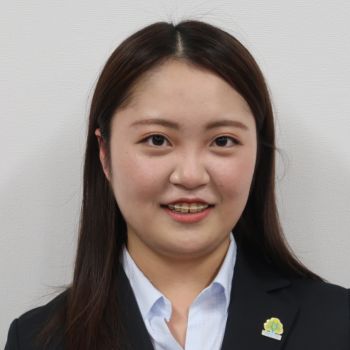
Ami Inohara / School of Global Humanities and Social Sciences, Nagasaki University
AMI INOHARA Hello, everyone. I’m Ami Inohara, a freshman of the School of Global Humanities and Social Sciences, Nagasaki University. I am originally from Okayama Prefecture, and I moved to Nagasaki when I entered Nagasaki University. I’m very glad to have been selected as a member of the 10th Nagasaki Youth Delegation because I have been interested in its activities since I entered Nagasaki University.
I grew up in Okayama, the neighboring prefecture to Hiroshima, which is the other atomic-bombed area, so I thought I was aware enough about peace and war, but when I came to Nagasaki, I was surprised to find that there was a high awareness among local students about nuclear issues. As Japan is the only country in the world to have suffered from atomic bombings, I feel that there should not be such a difference in awareness between regions in Japan. In addition, with the aging of the A-bomb survivors, the number of “witnesses” who experienced the horrors of the atomic bomb is decreasing, and I am afraid that the number of people who view nuclear issues as their own problem might also decrease. Therefore, I want to learn more about these issues through various activities with the Nagasaki Youth Delegation, and I want to contribute to making people more interested in them.
It may not be easy to realize a peaceful world free of nuclear weapons, but I will do my best to contribute, even in a small way, with the other members of the 10th Nagasaki Youth Delegation. Thank you.
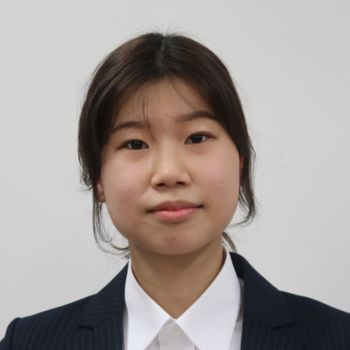
Myokyoung Kang / School of Global Humanities and Social Sciences, Nagasaki University
MYOKYOUNG KANMy name is Myokyoung Kang, freshman of Nagasaki University. I’m a 10th member of Nagasaki youth, and I would like to teach students information of nuclear in other prefectures. I came to Nagasaki from Osaka in April of 2021 and realized that people in Nagasaki have bigger awareness of nuclear than Osaka. I believe it is the motive for me to tell others what I learned in Nagasaki. As I noticed, there is a gap about the concern of nuclear between Nagasaki, Hiroshima and other prefectures. It resulted from the difference of amount of knowledge about nuclear. Japan is one country, but not all Japanese people recognize the scare of nuclear. In my opinion, knowledge makes people see things clearer and spread their view. I would like to store more information and see problems obvious. I and the youth members start to help people to understand the nuclear issue, the history about the world and our future.
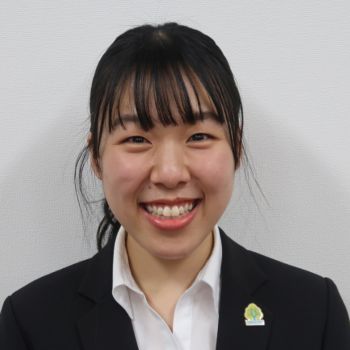
Ayuka Goto / School of Global Humanities and Social Sciences, Nagasaki University
AYUKA GOTOHello. My name is Ayuka Goto. I am a first year student at Nagasaki University, and I am studying at the School of Global Humanities and social Sciences. I am from Gifu and started living alone in Nagasaki since last spring. I had a chance to study in Panama when I was a high school student. I strongly feel that Japanese people should tell the importance of peace and the cruelty of nuclear to the world as people who live in the only country where the atomic bomb was dropped. Even Many Japanese may not know much about Panama, many Panamanians do know the name of Nagasaki as a city attacked by atomic bomb. Also, I saw ambassadors around the world come to Nagasaki and pray for the world peace. I believe that the Nagasaki Youth Delegation, which conducts peace activities in Nagasaki, a peaceful city that attracts attentions from a world, would be able to achieve my goals, so I decided to apply for this delegation. As a member of the Delegation, I will do my best to fulfill my mission with my colleagues. Thank you.
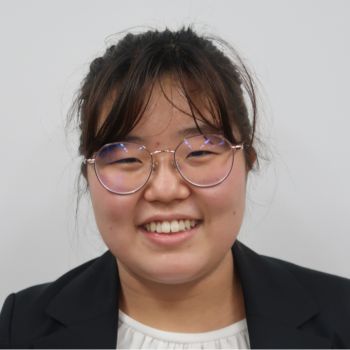
Yumi Komatsubara / School of Global Humanities and Social Sciences, Nagasaki University
YUMI KOMATSUBARAI’m Yumi Komatsubara, a first year student at the School of Global Humanities and Social Sciences, in Nagasaki University. The reason I wanted to be a member of the Nagasaki Youth Delegation was because of my experience of studying abroad when I was a high school student. When I was in high school, I went to Belgium, a European country and I had the opportunity to talk about war with my host family. Members of the host family were familiar with World War I and the attack on Pearl Harbor, and they gave me a lot of opinions. However, I was told that they were not familiar with World War II, especially the atomic bombs. Before I heard it, I had thought that many foreign people knew about the atomic bomb, so I was very shocked to hear that. And since I’m from Saga prefecture, which is next to Nagasaki prefecture, I had many opportunities to know about the atomic bomb. By these opportunities, I know the horror of the atomic bomb well, so I felt disappointed that my host family didn’t know about the atomic bomb. Through this experience, I started to want more foreigners to know about the atomic bomb. Therefore, I applied for the Nagasaki Youth Delegation and I would like to think about peace education that will deepen people’s understanding of the atomic bomb. Also, I would like to tell as many people as possible about the atomic bomb and the damage caused by the atomic bomb. And I would like to do my best to contribute to the abolition of nuclear weapons through such activities. Thank you.
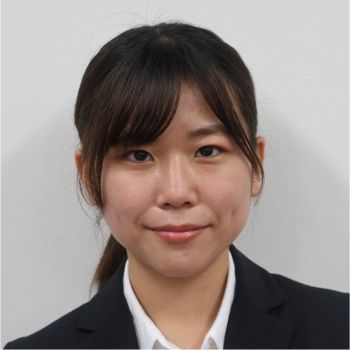
Nozomi Nojiri / School of Global Humanities and Social Sciences, Nagasaki University
NOZOMI NOJIRI Hello, I am Nozomi Nojiri. I belong to the School of Global Humanities and Social Sciences, Nagasaki University. I am from Miyazaki prefecture.
I visited Hiroshima and Nagasaki when I was a child, so I have always been interested in the history of war and atomic bomb. I came to Nagasaki in April 2021 to enter Nagasaki University, and I was able to hear the experience of an atomic bomb survivor in Nagasaki. I felt that I can learn a lot about nuclear weapons in Nagasaki, the place once devastated by atomic bomb, so I am glad to be able to participate the Nagasaki Youth Delegation 10th.
Various war-related books and movies have been released so far. When I saw them, I felt that people even lived under the war, still cherished their families and friends. However, two atomic bombs were dropped and they destroyed the precious lives under the mushroom clouds.
There are more than 13,000 of nuclear weapons in the world today. This issue concerns all of us. I will do my best during my term, aiming for a world without nuclear weapons, which atomic bomb survivors desire. Thank you.
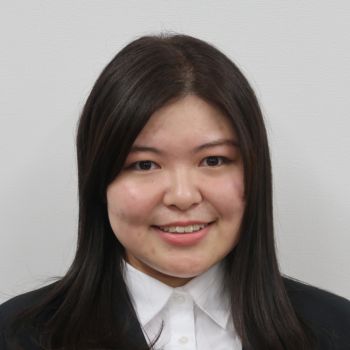
Kaede Fukunaga / Graduate School of Global Humanities and Social Sciences, Nagasaki University
KAEDE FUKUNAGA My name is Kaede Fukunaga. I was born and brought up in Saga before moving to Nagasaki. After finishing my bachelor’s degree at Nagasaki University I decided to continue my graduate study on Dutch civil society’s role on the decision-making process of the government for TPNW.
Below is a short explanation of why I decided to apply for Nagasaki Youth Delegation.
First reason is the regional gap in the opportunities for peace education in Japan. Although Saga is a neighboring prefecture of Nagasaki, I had very little opportunities to learn about peace, other than a school trip to Nagasaki. Actually, it was only when I started living in Nagasaki that I realized that my knowledge of the atomic bomb was limited to the fact that it was somehow different from ordinary weapons and that it was terrible. This experience made me realize that there is a need to create opportunities to think about peace evenly in Japan, regardless of whether it is an A-bombed city or not.
The second reason is one-year experience as a member of Peace Caravan. I became a member of them simply because I wanted to do something unique to Nagasaki while I was still a student. As a member, I gave a bunch of peace lectures with other members inside and outside Nagasaki for about a year. During my activities in Nagasaki, I felt again the disparity in basic knowledge about the atomic bomb between myself and students in Nagasaki. Also, I could learn about the unique peace education in Okinawa centered on the Battle of Okinawa, which made me reaffirm the importance of sharing the collective memory of the war, as an easier way of rethinking peace.
The third reason is that I learned about the Dutch civil society’ activities against the Dutch nuclear policy and TPNW. While I was studying in the Netherlands, I learned that civil society encouraged the Dutch government to participate in the negotiations for the 2017 Nuclear Weapons Convention, even though all other nuclear umbrella states did not participate it, and I strongly felt the potential of civil society. That is why I am currently researching the role of civil society in the Netherlands.
For these reasons I decided to apply for the Nagasaki Youth Delegation. Furthermore, I strongly felt that it is the best organization for me to accumulate knowledge about nuclear weapons. As the last generation to be able to directly hear the voices of the Hibakusha, I would like to work with the members of the delegation to find out how peace education should be and what I can do in Nagasaki, and to fulfill my term of delegation’s responsibly. In spite of the limited period of one year and the headwind of the Corona crisis, which restricts our activities beyond national and prefectural borders, we will continue to work with other members in a flexible and unique way.
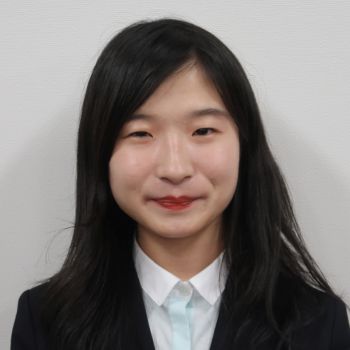
Yui Miyazaki / Faculty of Economics, Nagasaki University
YUI MIYAZAKI Hello, everyone. My name is Yui Miyazaki and I am a first year student in the Faculty of Economics, Nagasaki University. My father is a Japanese, my mother is a Korean, and I was born in South Korea, but I received peace education in Nagasaki when I was in elementary, junior high, and high school. I have lived in Korea for two years and in China for five years since I was a child, and I have experienced the peace education in abroad and Japanese schools. What I noticed was that I didn’t have the opportunity to learn about the atomic bombing of Nagasaki and Hiroshima and the nuclear issue at Japanese schools in other areas. I was very surprised that there was no peace education there because it was a natural to hold a peace meeting or observe a silent prayer on August 9 in Nagasaki’s school. At the same time, I thought that we should actively promote the peace lectures and think about the nuclear issue together as “current issue.”
Moreover, although there are opportunities to learn about peace at local schools in China, they learn about the history of workers and genocides that were forcibly brought by Japan, rather than peace education that focused on the atomic bombing of Nagasaki and Hiroshima. Scenes we have seen in the same war are different from those in Japan. We have as many histories as there are different peoples and countries, and I think we should have a wide variety of peace educations. However, learning the “nuclear problem” as a part of peace education everywhere, we will be able to get correct knowledge of nuclear weapons, have positive discussions with more people toward the “realization of a world without nuclear weapons,” and create solutions.
Through the activities of this Nagasaki Youth Delegation, I will encourage as many people as possible to think about peace, not only in Japan but also across the seas. Thank you.
